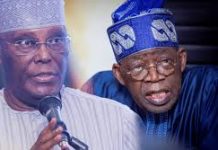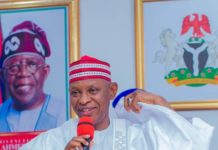There is a growing disquiet among politicians over secret moves by some members of President Muhammadu Buhari’s cabinet to be appointed as ministers by the President-elect, Bola Ahmed Tinubu.
Investigations revealed that no less than 18 of them have reached a frenzied height with the pressure they are applying on Tinubu to include them in his cabinet list after May 29 inauguration.
Specifically, a former Minister in Buhari’s first term confirmed that about 18 members of the present cabinet and older colleagues have indicated intentions to return under Tinubu.
Indeed, some of the ministers are said to have sent eminent Nigerians to London and France to mount last-minute pressure on Tinubu to convince him on why they deserve to be a part of the new government.
Tinubu, who is expected back in the country before the inauguration, travelled to Europe on May 10 on a “working visit to fine-tune the transition plans and programmes, and his policy options with some of his key aides without unnecessary pressures and distractions.”
In a statement by his media aide, Tunde Rahman, “Tinubu hopes to convince foreign investors of Nigeria’s readiness to do business under his leadership through mutually-beneficial partnerships premised on jobs creation and skills acquisition.”
However, while some Ministers who have been in government these past eight years are intensifying their lobby on the President-elect and preaching ‘continuity’ to his inner circles, many Nigerians are looking forward to an injection of ‘fresh blood’ and ‘new faces’ to stimulate some rapid changes in governance.
Supporters of these ambitious ministers are arguing that the new government will need their experience to continue with the programmes and policies of the ruling All Progressives Congress (APC). Tinubu had earlier hinted that competence and merit would be his major consideration in choosing his new cabinet members.
In a statement personally signed by him, the President-elect said: “In selecting my government, I shall not be weighed down by considerations extraneous to ability and performance. The day for political gamesmanship is long gone. I shall assemble competent men and women and young people from across Nigeria to build a safer, more prosperous, and just Nigeria.”
The ‘lobbying’ ministers are alleged to be the brains behind some of the unconfirmed ‘list of Tinubu’s ministers’ trending on social media to swing public opinions in their favour and test the waters.
Besides, these influential ministers played critical roles in the emergence of Tinubu, both at the APC primary and the February 25 presidential election in their respective states. For these ministers, the payback time is now.
Sources, who spoke to The Guardian, said while the appointment of the ministers is at the discretion of the President, he is expected to exercise such power by gauging the mood of Nigerians and the kind of government expected after eight years of the outgoing Buhari administration.
Secretary to the Lagos State Government (SSG) in the Second Republic, Elder Olorunfunmi Bashorun, told The Guardian that the 1999 Constitution empowers the President to appoint 40 ministers. One to represent each state of the federation and one from each geopolitical zone, but he warned Tinubu to be wary of succumbing to pressure from some of the outgoing ministers to be re-appointed into his cabinet.
Bashorun, a member of the Lagos Governance Advisory Council (GAC), said Tinubu should be thinking of elevating the business of governance above parochial sentiment.
The elder statesman, who also served as Commissioner for Education under Jakande administration, said: “If the President-elect should conduct a public opinion on the performance of the outgoing government, I am sure the result will support bringing in fresh blood. I don’t know any minister who deserves to be re-appointed, are you talking of the power sector or health, agriculture, commerce and trade? No, Nigerians deserve better than those people we have as ministers now.”
He, however, admitted that few of them performed creditably well, but they all deserve their rest after eight years in service. But former Minister of Communications, Abdul-Raheem Adebayo Shittu, disagreed with Bashorun, stating that the 1999 Constitution does not put a limit to the number of years or tenure anybody can serve as minister in Nigeria.
He said it is at the discretion of the President to appoint those who he thinks will add value to his government and nothing can be compared to experience.
According to the Ibadan-based legal practitioner, who served as Communication Minister between 2015 and 2019, “it is normal for politicians to lobby for political offices, but it is at the discretion of the President to appoint whomever he wishes.
“There are some ministers who worked to make Tinubu’s presidency a reality, nobody complained while they were working for him, can anybody now say they cannot be ministers, that is pedestrian thinking.
“In the advanced world, we have those who served their countries as ministers for over 20 years. What about lawmakers? Some people have been lawmakers in the U.S. for over 30 years. If somebody can serve as a lawmaker for such a long time, what stops anybody from serving as minister for as long as 20 or 30 years, once the President still considers him fit to serve? The older the wine the better, Nigeria needs their experience.”
The former Minister also disagreed with those who hold the impression that the serving ministers have not done much to deserve re-appointment. He asked the critics to mention the metrics for evaluating them before coming to such a conclusion.
To him, President Buhari has done well in delivering on his campaign promises of fighting corruption, insecurity and developing infrastructure. He said Nigerians should have confidence in the National Assembly that is vested with the powers to scrutinise the ministerial nominees. “Remember that the National Assembly has the power to approve or reject any nominee for appointment,” he said.
But a political scientist and Senior Fellow of the Centre for Democracy Development (CDD), Prof Adele Jinadu, has advised the President-elect to raise the bar in appointing his cabinet members, noting that he could only achieve his aim of providing good governance to Nigerians by applying meritocracy in all his appointments.
He lamented the situation where political appointments in the country are either purchased or ceded to godfathers, who in turn nominate their children or cronies to represent their interests in government. To him, it is worrisome that some people have turned public office into a vocation, despite non-performance.
Reacting to the pressure by some outgoing ministers to continue serving under Tinubu’s presidency, Jinadu, a former Director General, Administrative Staff College of Nigeria (ASCON) said “there is bound to be disagreement on what is normal in these circumstances, but if there is a tenure limit for chief executives, those who served with them should also be excused after their tenure.
“In our own case, it is worrisome that the appointment is being done without regard to performance in office to justify re-appointment to a certain position. It is also complicated because these positions are purchased either by themselves or through godfathers to place people in certain positions in public offices. To them, it is an investment, and most times a reward for loyalty.
“The bottom line is that there is something unusual in the way certain persons since 1999 have been in public office. They served as commissioners in their various states, and then became governors for eight years before going to the Senate and becoming Ministers without any spectacular achievement. So, these politicians have turned public office into a permanent vocation.
“I don’t see any of the ministers that are spectacular to deserve to be re-appointed by Tinubu because we don’t have a basis for their assessment since much of what they do is shrouded in mystery.
Jinadu also disclosed that efforts by CDD to evaluate the performance of the ministers failed during a project called ‘Buharinomics’ because there was nothing feasible to link their activities to the campaign promises of the President and ruling party’s manifestos. He said the time has come for the Senate to be more circumspect in approving ministerial nominees without asking them relevant questions about the value they are adding to governance. He said the idea of lawmakers asking ministerial nominees to recite the Nigerian pledge or sing national anthem as only yardstick to approve their nominations is not only archaic, but a disservice to the people, who trusted them with the responsibility of ascertaining the competence and capability of the nominees to serve the country.
He also urged the members of the public, professional bodies, and Civil Society Organisations (CSOs) to be more involved in the process of Senate’s approval for ministerial nominees by carrying out their private assessment on the nominees because “public scrutiny is very low and oversight by the National Assembly is weak.”
For a development expert, Dr. Kolawole Adegbite, members of the Senate should insist that the proposed portfolio should be attached to the ministerial nominees to be approved for them to be asked relevant questions that will show how deeply they understand the ministry they are being proposed to lead. He noted that the practice of approving ministerial nominees without having prior knowledge of the ministry to be posted to has been the major cause of putting round pegs in square holes and gross inefficiencies noted among ministers.
He said: “Tinubu should avoid committing ‘Type 1 error’ in his recruitment process. It is public knowledge that the Minister of Interior Affairs, Rauf Aregbesola, acknowledged that he knew nothing about the Ministry when he was posted there. And it took him some months to learn what they do.
“What about the Sports Minister, Sunday Dare, he is not known to be a sports administrator or enthusiast before being appointed to head the Ministry. I also believe that Labour Minister, Dr. Chris Ngige, has scant knowledge of what it takes to negotiate with workers and I cannot disagree with many that blamed him for the protracted ASUU strike. These people are fine gentlemen and professionals, but they are not posted to offices where they can perform optimally. That is the issue here.
“Tinubu should not make the same mistake and the National Assembly should help him and Nigerians to achieve this.”










































